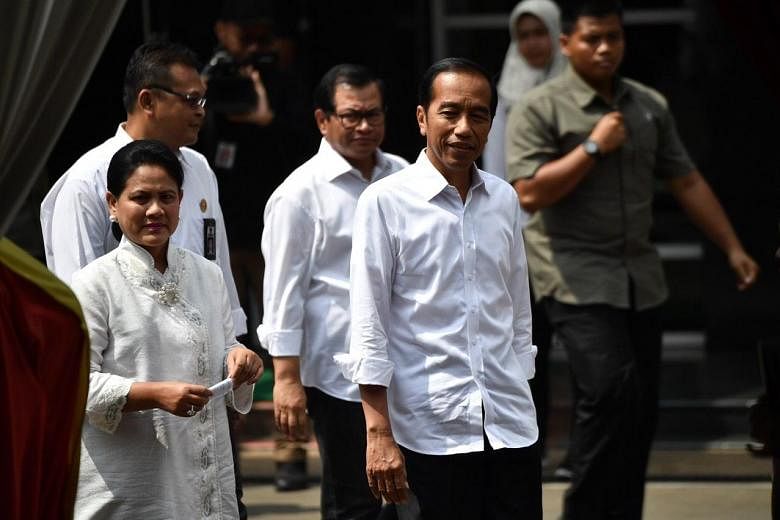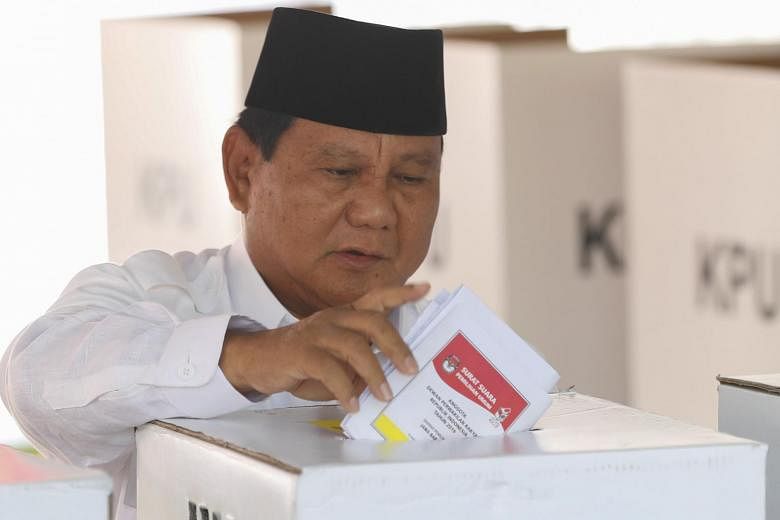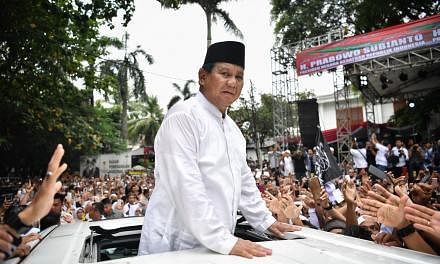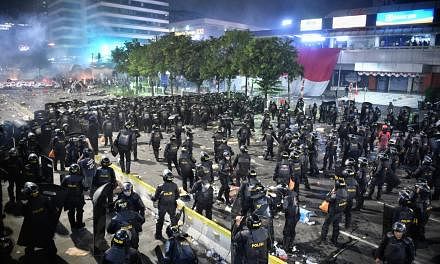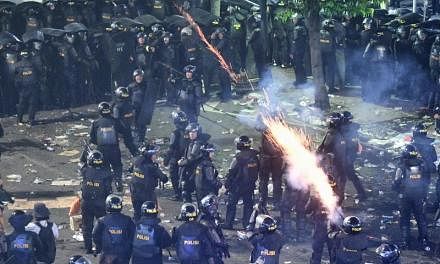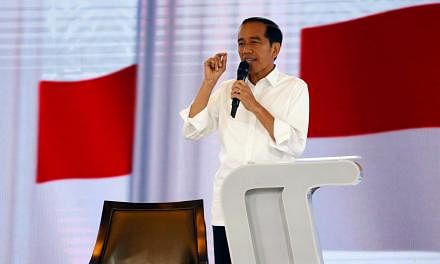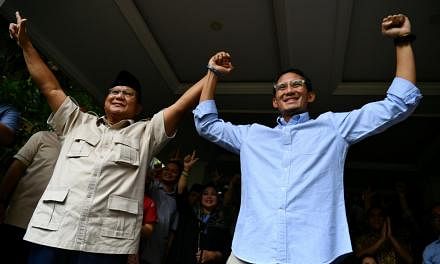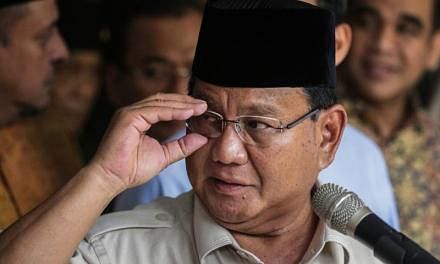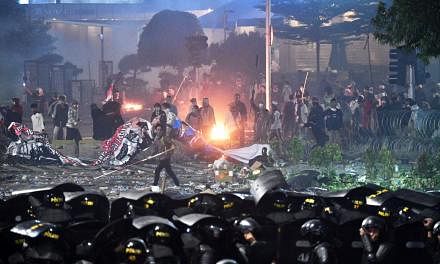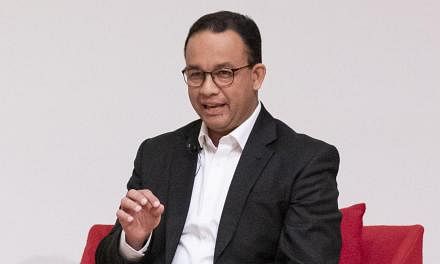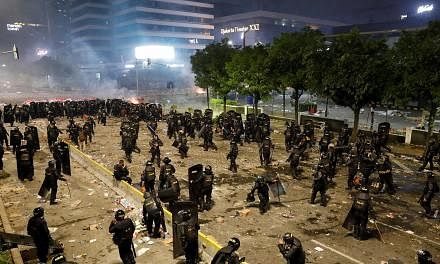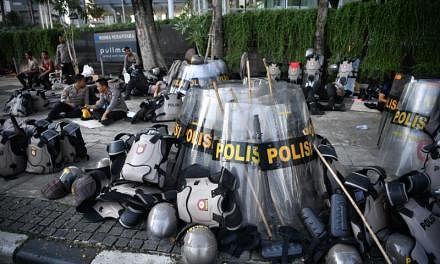JAKARTA - Voting in the presidential and legislative elections in Indonesia began on Wednesday (April 17) at more than 800,000 polling stations across the country.
Polls opened at 7am local time (8am Singapore time) and will close at 1pm.
More than 192 million Indonesians are eligible to vote for their president and local representatives, and the General Elections Commission (KPU) is hoping for a high turn-out.
The incumbent, President Joko Widodo, 57, who is seeking a second term in office, is expected to show up at his polling station at the State Administration Agency building in Central Jakarta later in the morning, while his 76 year-old running-mate Ma'ruf Amin will cast his vote in North Jakarta.
Presidential hopeful Prabowo Subianto, 67, and his running mate Sandiaga Uno, 49, voted in West Java and South Jakarta respectively during the morning.
Mr Prabowo, who is contesting the presidency against Mr Joko for the second time, voted at his polling station in Bojeng Koneng, West Java province.
This is the first time Indonesia is holding its presidential and legislative races simultaneously, making it the largest single-day election in the world.
About six million polling officials and close to a million military and police personnel are involved in ensuring that the polls are carried out smoothly and peacefully.
The Indonesian national police have stepped up cyber patrols, targeted potential conflict hot spots and prepared contingency plans to ensure security ahead of the high-stakes elections.
The legislative race itself will see about 240,000 candidates vying for over 20,000 seats at various levels of regional and local governments.
All eyes, however, are on the rematch between Mr Joko and Mr Prabowo. Mr Prabowo polled 46.85 per cent compared to Mr Joko's 53.15 per cent in 2014.
The two-way contest is said to have resulted in a highly polarised election amid rising religious intolerance, which peaked with the imprisonment of former Jakarta governor Basuki Tjahaja Purnama, an ethnic Chinese and Christian, for blasphemy against Islam in 2017.
Mr Joko will be hoping that his track record over the last four years or so in areas like building infrastructure and welfare reforms will be enough to win him a second term.
Mr Prabowo will be hoping that he has convinced voters that he can do better than the incumbent in alleviating poverty and improving the lives of Indonesians through a more nationalistic approach in rebuilding the economy.
Registered voters have until 1pm to cast their ballots in a complex five-stage process which starts with a comprehensive ID check.
Votes will be manually counted at the polling stations after polls close, but the official results for the elections will be announced only about a week later.
Unofficial "quick count" results, however, will be released hours after polling ends.
Quick counts conducted by private polling and survey agencies, which look at a sample of ballots after polling closes to estimate the overall vote, have largely proved to be accurate in past elections.
Mr Joko and Dr Ma'ruf are heading into Polling Day with an electability of between 47.2 and 59.9 per cent, based on an aggregation of several voter surveys released last weekend.
This gives them a comfortable lead over Mr Prabowo and Mr Sandiaga, who surveys say have between 38.8 and 45.5 per cent support.
Such pre-election surveys in Indonesia, however, have been off the mark in previous contests.
In the last elections in 2014, pollsters had expected Mr Joko to defeat Mr Prabowo by a wide margin, but the final results were much closer than predicted.
S. Rajaratnam School of International Studies visiting fellow Irman G. Lanti is expecting a tense finish to the presidential elections.
"Contrary to some results published by a number of research institutions that predicted a Jokowi victory by a comfortable margin, the elections will likely end up in a nail-biter," he said, using the President's popular moniker.
Mr Irman predicts that the vote difference in the presidential race may be only around one to two million, if not less, this time round.
"Any vote difference below the figure of three million (the psychological mark of 2 per cent of votes) will cause an almost immediate recourse by the losing party to the Constitutional Court," he added.
"But the process in the Constitutional Court will take some time, and in the interim, the situation in the country will remain tense, with each side claiming victory."
If true, both sides are likely to mobilise their supporters for street demonstrations, which may also spread beyond the capital Jakarta, and divide the country further.
"Although it is unlikely that we will see another massive Reformasi movement that brought down President Suharto in 1998, governing will become a challenge given the circumstances," said Mr Irman.
President Joko will be seeking a strong mandate for a second and final term in office, in order to realise his vision for reforms and more infrastructure development.
So anything less than a landslide victory will mean that Mr Joko will be in for a difficult period post-election, especially if Mr Prabowo suffers a narrow loss and mounts a legal challenge to the results and the electoral process.
